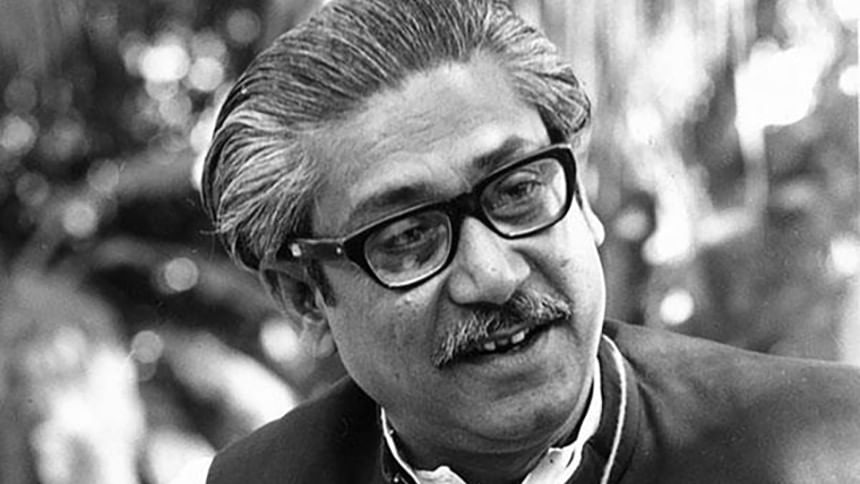The legacy of Bangabandhu

Like Nelson Mandela who dedicated his life to fighting apartheid, a system of racial segregation established by the National Party's white-only government in South Africa, Sheikh Mujib dedicated his life to fighting for the just causes of East Bengal: the demand for Bengali to be made one of the state languages side by side with Urdu, free Muslim League leadership from the clutches of a few aristocrats, establish East Bengal's rightful place in the administrative hierarchy in Pakistan, and fair and equitable allocation of the country's resources between the two wings of the country.
Due to his fight for the causes he believed in, he was continuously harassed by the government of Pakistan. He was arrested and imprisoned a number of times. In 1965, he was falsely charged with sedition and sentenced to one-year imprisonment, only to be released by an order of the High Court. In 1968, the government of Pakistan filed the infamous Agartala conspiracy case against Bangabandhu as a number one accused, with 34 other Bengali civil and military officials. The accused persons were charged with conspiring for the secession of East Pakistan from the rest of Pakistan through armed revolt. However, the conspiracy case did not make much headway. Almost all the approvers turned hostile. The government of Pakistan backtracked when a mass movement started and a furious mob set fire to the state guesthouse, and Justice SA Rahman, Chairman of the Tribunal, and Mr Manzur Quader, Chief Prosecution Lawyer, were compelled to leave East Pakistan. The government of Pakistan unconditionally released Sheikh Mujib and others.
Again, on March 25, 1971, Bangabandhu Sheikh Mujib was arrested, tried in camera for sedition in Lyallpur Central Jail in West Pakistan and was sentenced to death. It was due to the intervention of Zulfikar Ali Bhutto, who assumed the responsibilities of chief marital administrator and president, replacing General Yahya Khan, that Sheikh Mujib's life was spared. Bhutto set him free and sent him to London by PIA, from where the British government sent him to Bangladesh by its Comet Jet to lead the newly created sovereign state of Bangladesh.
Like Bangabandhu, Nelson Mandela was also repeatedly arrested for "seditious" activities, was unsuccessfully prosecuted in 1956 Treason Trial and finally was sentenced to life for conspiring to overthrow a legally established government. It was at the intervention of President Frederik Willem de Klerk that Mandela was released from prison in 1990. Nelson Mandela's first task was to work for national reconciliation. The inhuman treatment that he suffered at the hands of the apartheid government during his jail term was all forgotten and forgiven. Mandela and de Klerk led efforts to negotiate an end to apartheid. In the resultant 1994 multiracial general election, Mandela led his ANC party to victory and became president.
Bangabandhu Sheikh Mujibur Rahman's life was also one of reconciliation, not recrimination. During his political struggle for the rights of the Bengalis, he never ever made any distinction between the Bengalis and Biharis or between Hindus and Muslims. The support for the ruling elites of West Pakistan by Muslim migrants from eastern India drew the anger of the Awami League cadres. Sheikh Mujib, disturbed by the attacks on Urdu-speaking Biharis, publicly announced: "The Biharis and the non-Muslims are our sacred trust." On his triumphant return to his dreamland Bangladesh, where he got an unforgettable reception, he drove straight to the Racecourse Ground to address the mammoth gathering. In his address, he openly invited the Biharis and non-Bengalis to become good citizens of Bangladesh. Referring to Zulfikar Ali Bhutto's request to Sheikh Mujib, during their farewell meeting at the Chaklala Airport, to consider forging some sort of a loose confederation between Pakistan and Bangladesh, Bangabandhu said: "I convey my good wishes to the people of Pakistan. We now belong to two separate nations and I wish you and your people prosperity and happiness." There was no blame, no recrimination.
Sheikh Mujib displayed matured statesmanship when in 1974, under intense lobbying of some foreign ministers of OIC countries and its secretary general and Bhutto's threat to charge more than 200 Bangladeshi civilian officials trapped in Pakistan with espionage and high treason, he dropped the proposed trial of 195 Pakistani POWs accused of atrocities committed during the war of liberation. This paved the way for Sheikh Mujib's participation in the Islamic Summit in Lahore and the standing ovation of the heads of governments/states of the Islamic countries resulting in quick recognition of Bangladesh by Iran, Turkey, Saudi Arabia, China, etc.
Interestingly enough, like Sheikh Mujib, who is fondly referred to as the "Father of the Nation", Nelson Mandela, held in deep respect in South Africa, is also described as the "Father of the Nation". Both were charismatic leaders with great mass appeal. But the similarity between the two great leaders ends here. Nelson Mandela lived a peaceful life after retirement from the high office of the president and died at the age of 95. The cruel hands of assassins snatched away Bangabandhu's life on this day, August 15, in 1975 when he was at the prime of his life and could have served his beloved people for a few more decades.
Md Matiul Islam was the first finance secretary of Bangladesh.

 For all latest news, follow The Daily Star's Google News channel.
For all latest news, follow The Daily Star's Google News channel. 



Comments